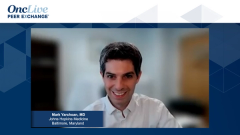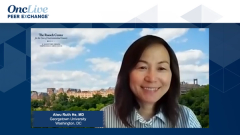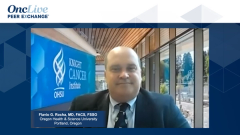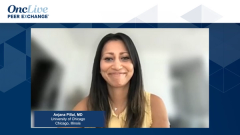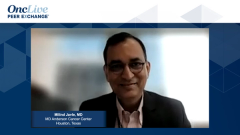
Advanced Biliary Tract Cancers: Managing Immunotherapy-Related Adverse Events
Expert perspectives on the toxicity profile of immunotherapy agents and how they can be managed in patients being treated for advanced biliary tract cancers.
Episodes in this series

Transcript:
Milind Javle, MD: I’m going to switch gears a bit to management of gem/cis [gemcitabine with cisplatin] and durvalumab. As I mentioned, we are incorporating this regimen in our practice, and Anjana, these patients are going to show up in your clinic because it’s a complicated situation. These are patients with elevated AST [aspartate transaminase] and ALT [alanine transaminase] levels to begin with. They may have some degree of biliary obstruction, if extrahepatic cholangiocarcinoma. Then we’re going to give them a PD-L1 inhibitor. What directions do you have for us in terms of how do you watch for toxicities? How do you follow these patients? How do you treat these toxicities so that we establish some degree of comfort in managing biliary tract cancer with IO [immunotherapy]?
Anjana Pillai, MD: Thank you, yes. I think that’s an important question. One of the things I would say is to involve your hepatologist early. That’s always a good idea because of things that we worry about as far as synthetic function of the liver, not necessarily an AST/ALT elevation gets us super worried, because if we believe it’s immune-related, we can get it under control with steroids or oncologists will have already done it. But once you start seeing the bilirubin go up, and once you start seeing INR [international normalized ratio levels] and the markers of underlying synthetic liver function, that’s when it becomes a little more nerve-racking. Many times when we see these patients, they’ve already been on high-dose steroids, and their numbers are going up, and there’s no imaging. So that’s another thing that’s very easy to do, get a good ultrasound to see if this is one of those rare causes of that biliary cholangiopathy that you see with immune checkpoint inhibitors. It’s easy to check an IgG4 [immunoglobulin G4] level to make sure there’s no underlying disease or underlying pathologies that could mimic that.
[It’s important to] involve the hepatologist so we can do a serologic work-up for underlying liver disease. Most people, just like with these cancers, with underlying liver disease, don’t know they have it until something happens. They don’t know they have autoimmune hepatitis. They don’t know they have PBC [primary biliary cholangitis] unless they become jaundiced. So, I think it’s important for us to look at underlying liver disease, get some basic imaging, and then get to them before their synthetic function is affected. I love a liver biopsy. I think it gives us so much information, even if it’s normal. That’s fine too, I even love that. Just in the sense of fibrosis, underlying fibrosis, steatosis, and necrosis, it doesn’t have to look like classic immune-related hepatitis for me to realize this is the diagnosis. Even if it doesn’t, because most of the time with the steroids that’s masked already, you still get a lot of information from a liver biopsy.
Milind Javle, MD: I’ll give you an example of someone from my practice, Anjana. Just a few weeks ago, someone was treated with a combination, had a preexisting biliary stent, and then developed liver enzyme elevations. It was the weekend, the hepatologist said he’d see us the next week….
Anjana Pillai, MD: Darn hepatologists.
Milind Javle, MD: I ordered a scan, and the biliary tract was not dilated, it looked the same, but all the liver enzymes were going through the roof. I put the patient on 1 mg/kg of prednisone, and then the hepatologist finally saw [the patient] the following week, by which time the liver enzymes were improving. So the question then was, what is the next step? Most of the guidelines would require steroids for 3 to 4 weeks in tapering doses, some type of ... prophylaxis, some type of consideration for a steroid-sparing agent in the future, and then the consideration as well that we should retreat the patient with immunotherapy or checkpoints. How do you manage all these issues in your practice?
Anjana Pillai, MD: I try to risk-stratify with those questions you’re asking. One, yes, in my experience these patients have needed quite high doses for some time before you effectively suppress them. I saw this earlier with patients with lung cancer when we were first using all these checkpoint inhibitors, they would taper down with prednisone to 5 or 10. All of a sudden, the numbers would go up again. It sometimes would take 3 to 6 months to get these patients under control. The other agent I use is antimetabolites. I’ll use CellCept, and it works really well ... with the steroids, not by itself. When you’re having these refractory numbers and you’re on high doses, and it’s not quite budging, if you do 500 or 1000 mg BID [twice a day] of CellCept, you do see good improvement. Follow those enzymes closely; I do weekly to biweekly laboratory tests. I get nervous about INR and bilirubin more than just the liver enzymes. The vast majority do respond.
There is a paper in Hepatology where my colleagues discuss how to taper prednisone and the effects of dual immune checkpoint inhibitor versus single in these patients and their liver function. That’s one of the things I ask the oncologist, if they have the severe reaction, can you go to a different agent? Do you still get effective therapy if you’reusing dose reduction? I think all those would depend on the extent of how the liver looked when it got exposed to these checkpoint inhibitors. I often see when they’re reintroduced, the same thing does happen again unless it’s single agent, if you add a dual checkpoint inhibitor, high toxicity. But if you change to a single agent, I still have seen the same toxicity profile. I don’t know that I have a clear answer to that, except to be careful and monitor those patients carefully. I don’t know if that’s been your practice as well in these patients.
Milind Javle, MD: Yes. Admittedly it’s relatively new, using durvalumab for biliary tract cancer. But yes, we have a similar paradigm. Anjana, most patients are being treated in the community, right? They don’t have access to Dr Pillai over there. So what sort of advice do you have?
Anjana Pillai, MD: I would advise to check the liver tests more frequently than you’re probably used to. That’s usually what I find, that the liver tests haven’t been checked for months. I think it’s nice to have a baseline. I always check for hepatitis B to make sure there’s no risk of reactivation. Everyone should be checked for hepatitis C, everyone over the age of 18 and really anyone. Those are basic things you can look to mitigate liver decompensation. Then I usually, in our practice…we’ll check liver enzymes a month after, and if everything looks good, maybe in 3 months. This is just to make sure that there’s no significant elevation. A baseline is always a good idea so you know where you started, so you can figure out how anxious you need to be if things go higher.
Milind Javle, MD: Ruth or Mark, have you had any experience with durvalumab or any other checkpoint inhibitor-related hepatotoxicity in biliary tract cancer that you’d like to share with us?
Aiwu Ruth He, MD: I’ve treated some, but I have not seen many liver toxicities. I’ve seen pruritis, itching, and/or mild skin rash. I guess I haven’t treated enough. Though, if you look at the TOPAZ study, the immune-mediated toxicities in general are relatively low compared to other IO therapy. Grade 3 or 4 AEs [adverse events] I remember were a few percent. I think all immune-mediated AEs were reported to be 12%, including grade 1 and 2. So in general it has been quite well tolerated. I don’t know if Mark has any cases that showed immune-mediated toxicities.
Mark Yarchoan, MD: I’ve seen a couple of toxicities with PD-1 or PD-L1 inhibitors in cholangiocarcinoma, mostly on clinical trials because these agents are fairly new in standard clinical practice. As Ruth said, I think the rate of immune-related adverse events in TOPAZ is reassuringly low. She mentioned the rate was about 12.7% for a placebo of all immune-related adverse events. But actually, the rate in the placebo arm was 5%, so it’s even lower than the 12% that’s quoted. I think that oncologists in a community generally are pretty comfortable managing these adverse events after years of managing them for all tumor types.
Milind Javle, MD: Wonderful.
Transcript edited for clarity.


